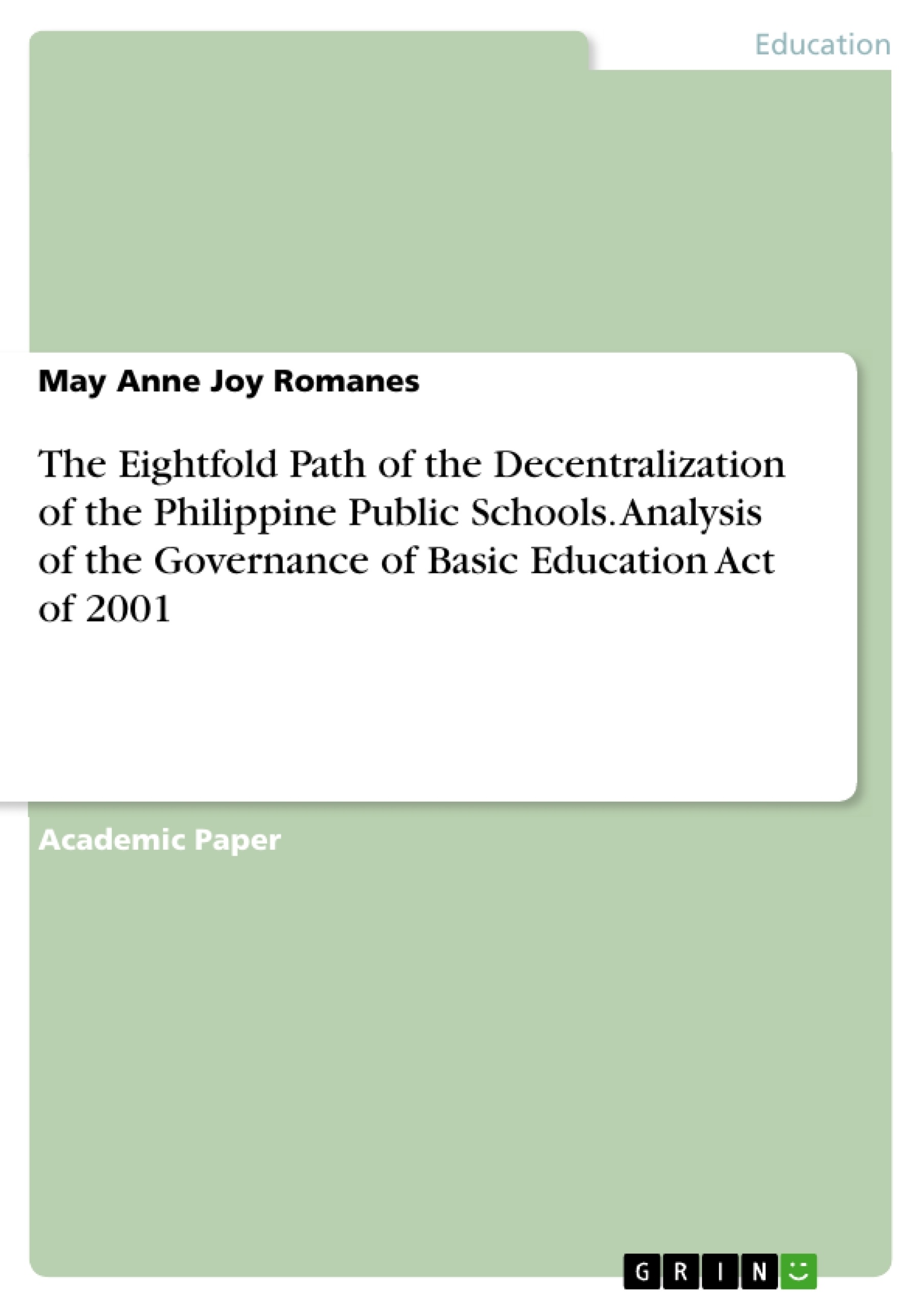Major education surveys and missions have labeled Philippine education as problematic from the period of 1925 to 2000. One of the major findings from these reports was the excessive centralization of the Philippine education. On the positive side, as time has passed, people have become more receptive to new policy ideas. Republic Act (RA) 9155, or the Governance of Basic Education Act of 2001, has helped the Department of Education (DepEd) reach its present “improved” status. In this paper, the said Act is examined using the Bardach and Patashnik model (2016). The majority of the references written before the passage of the law were studied to look into the history of problems and events that influenced the drafting of the law. The Bardach and Patashnik model involves the analysis of eight stages of policy cycle. Each part will be explained in the succeeding paragraphs.
Table of Contents
- Step One: Define the Problem
- Monroe Survey
- Economic Survey
- UNESCO Mission
- EDCOM Report
- Los Angeles Times
- Philippine Education Sector Study
- Presidential Commission on Educational Reform (PCER)
- Project Teacher Assistance for Optimum Well-Being (TAO)
- Step Two: Assemble Some Evidence
- Governance
- Teaching and Learning
- Human Resource Development
- Step Three: Construct Alternatives
- The 1990s' Policy Recommendations
- The "Eightfold Path" of the Decentralization of the Philippine Public Schools
- Step Four: Select Criteria
- The Department of Education's (DepEd) Perspective
- The Research-Based Perspective
- Step Five: Project the Outcomes of Each Alternative
- Improved Governance, Human Resource Development, and Teaching and Learning
- Step Six: Confront the Trade-offs
- Political Will and Resource Allocation
- Step Seven: Decide
- Decentralization of Basic Education Governance
- Step Eight: Tell Your Story
Objectives and Key Themes
This paper analyzes the Governance of Basic Education Act of 2001 (Republic Act 9155) in the Philippines using the Bardach and Patashnik model (2016), which involves analyzing eight stages of the policy cycle. The paper aims to understand how the Act addressed the historical issues in the Philippine education system and to explore the key themes shaping its development.
- Decentralization of the Philippine Education System
- Governance of Basic Education in the Philippines
- Analysis of Education Policy in the Philippines
- Historical Context of Philippine Education
- The Role of the Department of Education (DepEd)
Chapter Summaries
The paper begins by outlining the historical context of Philippine education through the analysis of several education surveys conducted from 1925 to 2000. These surveys consistently identified significant problems, including excessive centralization, low investment in education, lack of school facilities, underpaid teachers, low quality of graduates, differences in language instruction, lack of textbooks and learning materials, and inadequate teacher training. The paper then categorizes these problems into three key themes: governance, teaching and learning, and human resource development.
The paper then delves into the process of constructing alternatives, focusing on policy recommendations from the 1990s and the "Eightfold Path" of decentralization outlined in the Governance of Basic Education Act of 2001. It examines the criteria used for selecting these alternatives, including perspectives from the Department of Education (DepEd) and research findings.
The paper further discusses the projected outcomes of the decentralization policy, highlighting its potential to improve governance, human resource development, and teaching and learning. It also acknowledges potential trade-offs, such as the need for political will and resource allocation. The paper concludes by presenting the decision to decentralize basic education governance as a crucial step towards improving the Philippine education system.
Keywords
This paper explores the core concepts of decentralization, educational governance, policy analysis, and the historical evolution of the Philippine education system. It delves into the challenges of centralisation, underfunding, and inadequate teacher training, while highlighting the significance of the Governance of Basic Education Act of 2001 as a landmark policy reform. The paper emphasizes the interconnectedness of governance, teaching and learning, and human resource development, ultimately aiming to contribute to ongoing discussions on improving the quality of education in the Philippines.
- Citation du texte
- May Anne Joy Romanes (Auteur), 2021, The Eightfold Path of the Decentralization of the Philippine Public Schools. Analysis of the Governance of Basic Education Act of 2001, Munich, GRIN Verlag, https://www.grin.com/document/1035631



